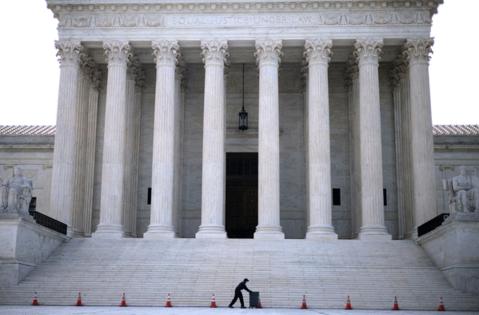Supreme Court questions EPA water pollution permit powers
Published in News & Features
WASHINGTON — The Supreme Court appeared ready in oral arguments Wednesday to restrict the EPA’s ability to set broad water quality standards for sewage and other systems as part of a challenge from San Francisco to the agency’s powers under the Clean Water Act.
The case turns on how specific the EPA must be in National Pollutant Discharge Elimination System permits it issues under the environmental protection law. Currently, the permits place restrictions on both what San Francisco and others can discharge from their pipes and the quality of the water where the discharge goes.
Across more than 90 minutes of arguments, the justices dove into the particulars of the law, and conservatives on the court questioned whether the EPA’s approach fairly informed permit holders of their liability.
The city has asked the justices to overturn a decision by the U.S. Court of Appeals for the 9th Circuit that upheld the permit rules.
Chief Justice John G. Roberts Jr. said the EPA’s current approach allows it to “sit back” and blame everyone in an area when a body of water doesn’t meet standards.
“What the permit system was designed to do was give some notice to the different dischargers about what was going to be required of them,” Roberts said. “Your water quality system gives you complete discretion in who’s going to bear the burden and who’s not.”
Changing the EPA’s authority on water quality permits could reverberate across cities and industries.
San Francisco attorney Tara Steeley argued that the EPA’s broad language in the permits means the city doesn’t know what it is allowed to do until after the fact, when water quality could be impacted by other permit holders or unknown pollutants.
“Cities like Los Angeles and like San Francisco can be subject to liability, without any advance notice anything about our discharges is going to cause a problem, and without the ability to prevent that liability,” Steeley told the justices.
Dozens of organizations, ranging from the mining industry to homebuilders and farmers weighed in through court filings to argue that the EPA standards leave them guessing over whether they’ll face fines down the road.
Biden administration attorney Frederick Liu argued that the EPA uses general standards in most cases rather than require permit holders to provide specific information and testing about what, exactly, they intend to discharge into a body of water.
“I think all regulated parties would prefer to essentially have their cake and eat it too, to not have to give us the information but also not have to face these generic prohibitions,” Liu said.
Justice Brett M. Kavanaugh said the EPA’s current standards seem to hold San Francisco and other permit holders accountable for water quality it was impossible for them to know about.
“The problem is, you can go after an individual entity like the city of San Francisco based on when they didn’t know what the relevant limitation on them was, and seek retroactively without fair notice, huge penalties including criminal punishment, based on something that was — they didn’t know what they could discharge or not discharge,” Kavanaugh said.
Kavanaugh pointed out that in separate litigation San Francisco currently faces millions of dollars in penalties because of the current permitting system.
Liu pointed out that San Francisco is facing those penalties after refusing for years to update a combined sewage/stormwater system that city officials knew was inadequate. Liu argued many of the requirements San Francisco says are unfair are actually obvious, like not allowing the water to become discolored.
The case is the first in a series of cases this term where the justices agreed to hear challenges to environmental rules, and comes amid the current court’s long-running effort to rein in administrative agencies.
The court has also agreed to hear challenges to environmental reviews in an upcoming case, Seven County Infrastructure Coalition v. Eagle County, Colorado.
The court is expected to issue a decision in Wednesday’s case, San Francisco v. EPA, before the conclusion of the term at the end of June.
©2024 CQ-Roll Call, Inc., All Rights Reserved. Visit cqrollcall.com. Distributed by Tribune Content Agency, LLC.







Comments